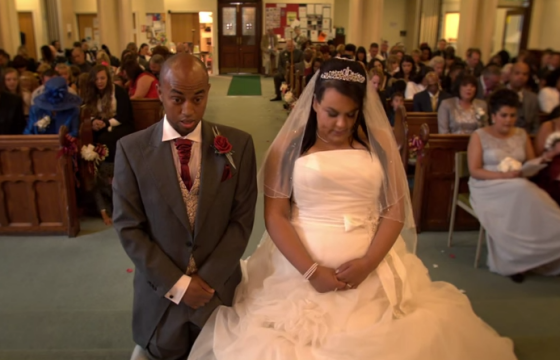This is the text of a sermon preached at Guildford Cathedral, Evensong on 9th September. The readings were Exodus 14:5-end and Matthew 6:1-18 leading to a particular focus on the Lord's Prayer.
If
you tuned into Radio 4’s Just a
Minute this lunch time, you would’ve heard Paul Merton attempting to talk
for 60 seconds without hesitation, repetition or deviation on the subject “Abandon
Ship”.
He began: “The Titanic had a band on ship and they were playing tunes as the ship sank into the murky waters below…’. He paused and Julian Clarey buzzed in with 51 seconds to go.
He began: “The Titanic had a band on ship and they were playing tunes as the ship sank into the murky waters below…’. He paused and Julian Clarey buzzed in with 51 seconds to go.
Merton,
as a satirical comic, is adept at humorous word play, even in the face of
tragedy. Tragedy feels particularly
acute when we are on the cusp of new possibilities; when it feels as if freedom
is within our grasp; when we delight in the scale of human ambition; when hopes
are thwarted by forces beyond our control.
Titanic
encapsulated those feelings and in the hands of James Cameron it becomes an
epic romance and disaster movie staring Kate Winslet and Leonardo DiCaprio as
Rose and Jack. They transgress boundaries of wealth, class and the constraints
of an arranged marriage as Celine Dion sings: ‘my heart will go on’.
Southampton’s Titanic Story conveys the realities behind this Hollywood blockbuster: hundreds of head shots of the people who lived, worked, traveled and died together on one fateful night.
Southampton’s Titanic Story conveys the realities behind this Hollywood blockbuster: hundreds of head shots of the people who lived, worked, traveled and died together on one fateful night.
The meticulous order of a two person birth is recreated: neatly folded linen on compact bunk beds - hat and gloves casually set aside.
The devastating disorder of the ship breaking apart is recreated: a light and sound installation of gloom, water, and dawn light - furniture breaking up.
The
words of eye-witnesses bubble up across the screen; they fade and drift of
away, these echoes of memory, disbelief and trauma. Their speech tries to piece together all that
was breaking apart: lives, dreams, relationships, Titanic herself.
One survivor says:
We
all said our prayers there, the Lord’s Prayer, altogether.
We
reach for these words when there is nothing left to say; when we cling to
another in heartrending grief.
The
words Jesus taught his disciples intersects with our lives; we reflect on the
meanings given to each word and phrase, listening with the ear of the heart for
what consoles and challenges.
It
is said with hope and trepidation at the beginning of a day; in exhaustion and
thanksgiving at its end. It’s familiar rhythms lending us an inner stability.
It
is the prayer which teaches us how to pray. It is a living text. Simple enough
to be memorised by children; broad enough to express the depth of our longings;
ordinary enough to name our basic needs; ingrained enough to be recalled when
dementia means we can no longer remember who we are; profound enough to sustain
a lifetime of praying.
Last
year, the Church of England launched a 57 second film called Just Pray (which your can watch here):
Our
Father in heaven: as Archbishop Justin walks though Lambeth Palace Gardens.
Hallowed
be your name: as a young man places flowers on a grave.
Thy
Kingdom Come: as a first responder is called to the scene of an accident.
Thy
will be done: as a guy lifts free weights.
On
earth as it is in heaven: as a farmer feeds his cattle.
Give
us this day our daily bread: sung by a gospel choir and spoken before a meal.
Forgive
us our trespasses: as a computer train speeds into London.
As
we forgive those: in a men’s group in a gym.
Who
sin against us: by a woman carrying private grief.
And
lead us not into temptation: as a policeman responds to the next call.
Deliver
us from evil: as the Community of St Anselm share in worship.
For
thine is the Kingdom: as an adult is baptised.
The
power and glory: at a school assembly.
For
ever and ever: at the end of a wedding.
Amen:
said and sung, for this prayer is for everyone.
We
add our voices today: in the silence of our hearts; in the music written by
Clucas: Our Father.
Jesus
is inviting us to stand where he stands: to put ourselves in the presence of
God, with the Spirit of his Son in our hearts; and to cry Abba! Father! He
invites us to ponder the depth of love divine, all love’s excelling.
He
invites us into a vision of a world infused with the light of God.
In
that light, we ask for what we need: for mercy, protection and forgiveness; for
daily bread, for strength and sustenance; for grace to bear the needs of others
and humility for others to support us.
Prayer
of this sort demands a kind of ‘forgetfulness’: a letting go of our
overpowering sense of self; with all the literal and metaphorical filters we
might apply to our appearance and self-presentation. The ‘selfie’ we captures a
moment but airbrushes our all that is not perfect.
Jesus
cautions the hypocrisy of living preoccupied by our image; of living to be
noticed. He cautions against turning acts of generosity into attention seeking;
or making our inner spiritual lives into a spectator sport.
Instead
we are invited to make space and time away from distraction and competition. To
find a private place where our desires, emotions and needs can be held in
peace.
This
is a practical way of praying: noticing what gives life; and what drains our
energy; to discern glimpses of goodness; to name hurts or selfishness; for our
lives to be shaped by God’s love; allowing heaven to be known on earth.
Praying
these words, expands our imaginations with generosity; increasing our capacity
to be vulnerable, resilient and compassionate. Letting go of conflict and
rivalry; living out the words that Jesus taught be seeking justice and
reconciliation.
Exodus is a stark reminder of the way in which moments of liberation can mingled with the hardening of hearts, mixed motives and anxiety about the future. The flight towards freedom confronts the pursuit of power. There are some injustices which are so systemic and horrific that putting them right demands humility, penitence and a radical change of culture.
The Lord's Prayer is not easy; it is hard be liberated from bonds of indebtedness; forgiveness can’t be a demand or a crude bargain to
just ‘get on with life’; rather it takes us to the heart of truthful
recollection, in incremental steps of release.
Tonight
we are invited afresh not to learn about it, but to pray it.
To
pray for mercy and healing, vision and strength; allowing the Spririt to
breathe through each word and phrase.
Just
pray.
Today, this week, this month: on the train, before sleep, as the kettle boils; at the gym, before music practice, as you do the online shop.
Today, this week, this month: on the train, before sleep, as the kettle boils; at the gym, before music practice, as you do the online shop.
We
all said our prayers there, the Lord’s Prayer, altogether.
Our
Father...
Who art in heaven.... hallowed be thy name
Who art in heaven.... hallowed be thy name
Thy
Kingdom Come
Thy will be done...
... on earth...
as it is in heaven.
Thy will be done...
... on earth...
as it is in heaven.
Give
us this day our daily bread.
And
forgive us our trespasses...
as we forgive those... who trespass against us.
as we forgive those... who trespass against us.
And
lead us not into temptation...
but deliver us from evil.
but deliver us from evil.
For
thine is the Kingdom...
the power...
....and the glory.
the power...
....and the glory.
Now...
... and forever.
Amen.
© Julie Gittoes 2018













